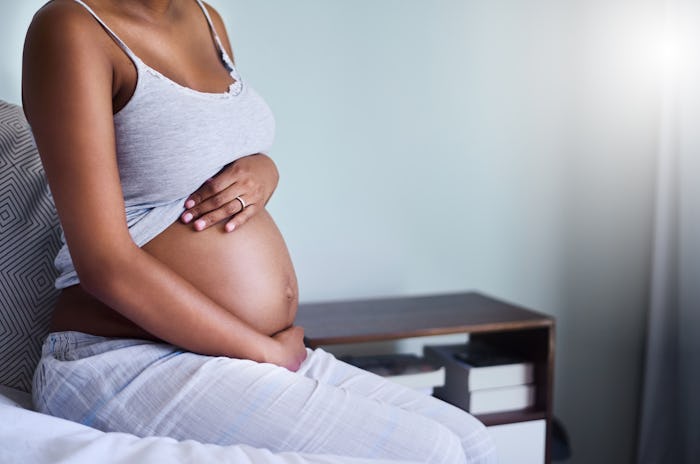Pregnancy Sex

Why Does Sex Hurt During Pregnancy?
Even when you want to have pregnancy sex, sometimes your body just isn’t having it.
Throughout the nine-month period where there is a baby growing inside of your womb, experiencing some pain is absolutely expected. But why does sex hurt during pregnancy? You expected a sore back and body aches, but painful intercourse can also be one of the less pleasant side effects of pregnancy.
The pain that comes from pregnancy sex can be described in so many ways. You may feel pressure, shooting pains, sharp pain, or soreness. The thing about pregnancy is that your body is undergoing dramatic changes rather quickly, and all of these changes can contribute to feeling discomfort during sex. Read on to see a breakdown of what experts say can cause sex — something that used to feel amazing — to hurt during pregnancy.
Your Growing Belly, Just In General
Anyone who has ever grown a baby in their body can attest to the fact that at a certain point, it just gets in the way. You can’t bend over to tie your shoes or paint your toenails, so it makes sense that your ever-growing bump could also make sex feel uncomfortable at best.
“The most common cause of discomfort is just size — trying to find a comfortable position for sex,” OB-GYN Dr. Mary Jane Minkin tells Romper. “I encourage patients to keep experimenting to find what works best for them and to be creative.”
Additionally, the extra weight and stress on your body as it adjusts to carrying your baby can cause pelvic pain that can make sex hurt. “ Temporary pelvic pain can also make pregnancy sex uncomfortable for some women,” certified sex educator Dainis Graveris tells Romper. “It’s often felt during pregnancy as the body stretches your pelvic ligaments and bones to make room for your growing baby.”
Hormones & Increased Blood Flow Play A Big Role
“Increased blood volume and reduced tissue hydration can lead to discomfort during pregnancy sex,” birthing expert and doula Sara Lyon tells Romper. “You will build about 50% more blood volume during your pregnancy, and that blood is stored all over your body, including your genitals. For some women, this engorgement in the vaginal tissue means increased pleasure — sensations are heightened, particularly around the clitoris. For others, this can be uncomfortable, leading to oversensitivity and even vulvar hemorrhoids.”
The release of hormones in your body shifts throughout the different stages of pregnancy. So, while you may feel totally fine during sex in your first trimester, by the third, you may not be able to handle it. Everyone’s body is different, but these hormone changes can certainly contribute to pain during sex while you’re pregnant.
“The release of the pregnancy hormone relaxin stretches and shifts your pelvic ligaments and bones for your growing fetus,” Graveris says. “These changes cause temporary pain in the lowest portion of your torso, leading to discomfort or pain while having sex.”
Hormones can also be responsible for mood fluctuations that can impact how sex feels while you’re pregnant. They can also make your body more sensitive, in addition to the issue of increased blood flow. “Engorged breasts and genitals, for instance, make a pregnant woman more sensitive to touch, leading to uncomfortable or painful sex,” Graveris says.
Dryness & Uterine Cramping Can Occur
“Dryness isn't usually too much of a problem because of the high estrogen state of the pregnancy. However, if a woman is anxious or there hasn't been a lot of foreplay, she could be dry on that basis,” Minkin says. “So more foreplay could be helpful, and again, working on a comfortable position could help, and lubricants are fine to use.”
Although it isn’t always the case, the hormones that your body produces during pregnancy can also contribute to vaginal dryness that could cause discomfort during sex. “When you’re pregnant, your body releases the primary stress hormone cortisol that causes dryness in the vagina,” Graveris says. “Vaginal dryness causes friction, making pregnancy sex uncomfortable or painful for some women.”
Another uncomfortable issue you may run into is some mild cramping during pregnancy sex. “The release of oxytocin, another pregnancy hormone, also results in mild uterine contractions after women orgasm. When combined with hypersensitivity during pregnancy, these mild cramps or contractions can make sex uncomfortable or painful,” Graveris adds.
How To Cope With Painful Pregnancy Sex
Painful sex can be especially frustrating when you’re pregnant. Between your burgeoning belly, sheer exhaustion, morning sickness, and a range of other pregnancy-related side effects, when you muster up the energy to have sex and then it hurts to the point where you have to stop, there are literally no words to describe the disappointment. But, the stress over this exact issue can actually make things worse.
“Stress and anxiety that roots from the fear of sex potentially harming your baby can also make your overall sexual experience uncomfortable,” Graveris says. “When you’re stressed, your muscles tense and tighten, making sex painful.” Try to relax and don’t put too much pressure on yourself. Right now, the focus should be on growing your baby and just enjoying sex when you can as a bonus.
While some pain during sex while pregnant is expected, talk to your doctor about the pain you feel during sex so that they can rule out anything that could be a danger to you or your baby.
“If you’re experiencing significant burning, itching, bleeding or swelling in and around your vagina after sex, check in with your healthcare provider to rule out infections that could require treatment, like a UTI or a yeast infection,” Lyon says.
Experts:
Sara Lyon, birthing expert, doula, author of The Birth Deck and You’ve Got This: Your Guide to Getting Comfortable with Labor
Dainis Graveris, certified sex educator, relationship expert at SexualAlpha
Mary Jane Minkin, MD, OBGYN, Clinical Professor of Obstetrics & Gynecology at Yale University
This article was originally published on